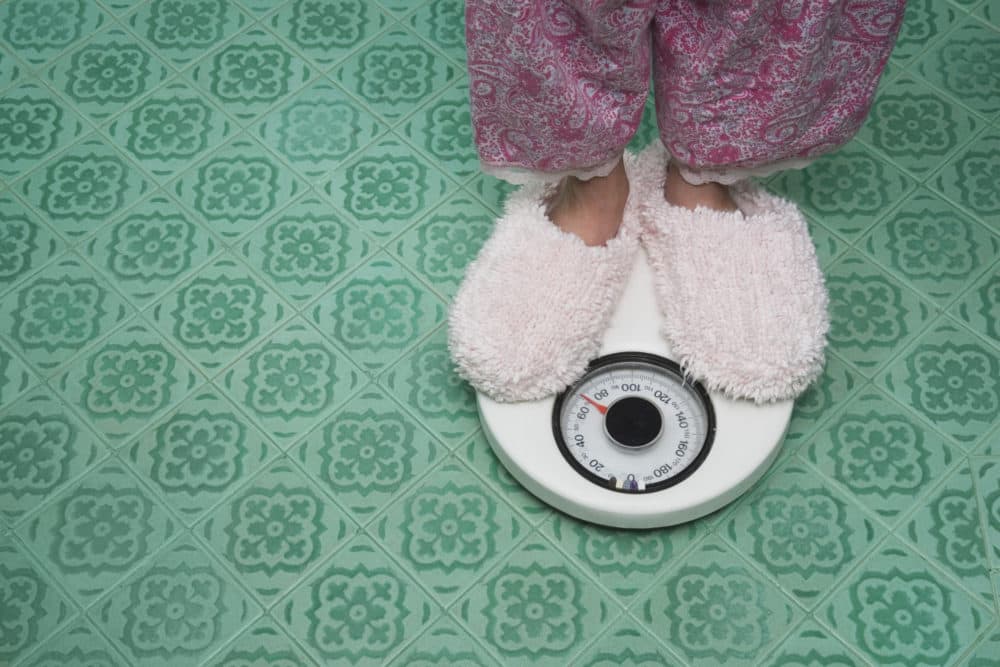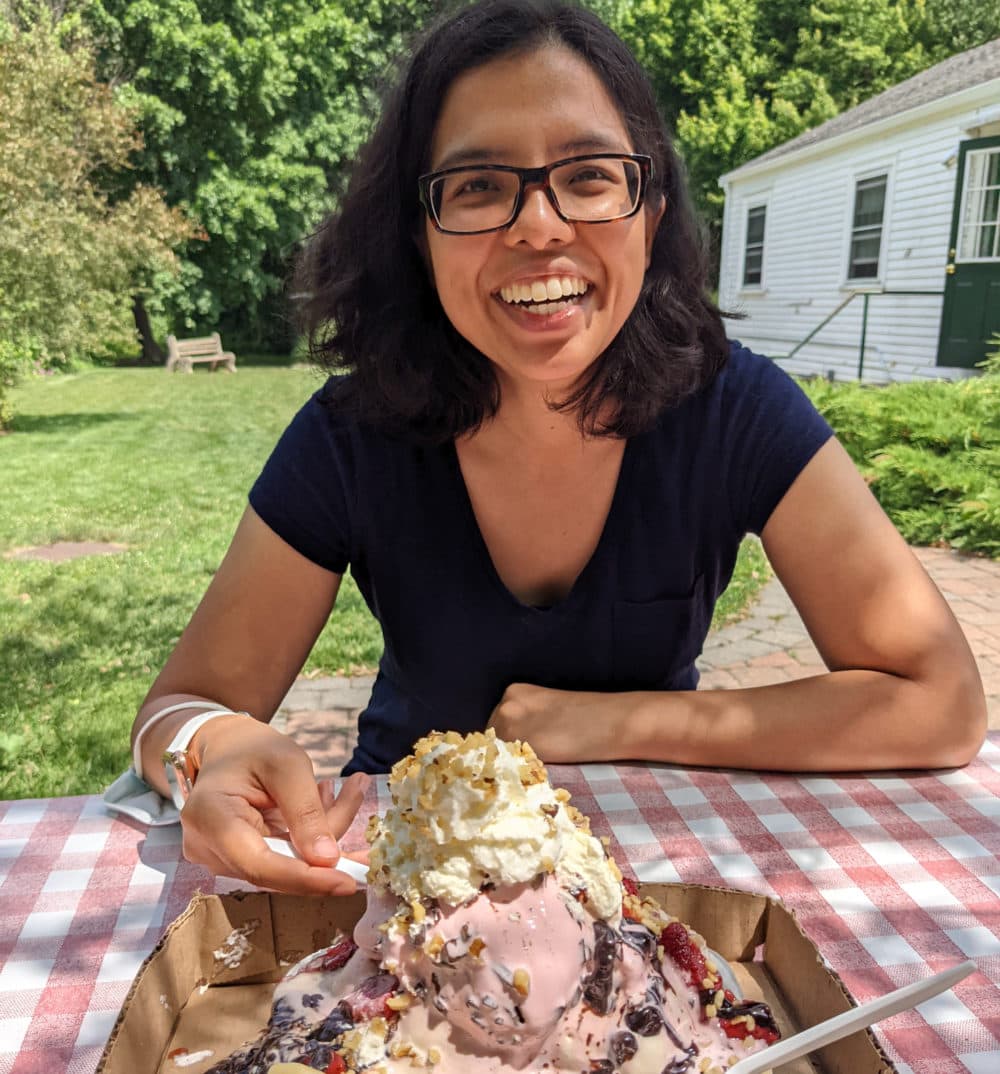Advertisement
Commentary
In Defense Of The Quarantine 15

According to a Twitter ad, if I enter my weight into a calculator, it’ll tell me how long I need to fast in order to lose my COVID pounds. The Internet abounds with “quarantine-15” weight-loss strategies.
According to a news report, over 40% of Americans gained weight during the pandemic. I’m one of them, and here’s a dirty little secret — I’m okay with it.
For most of my life, I’ve waged a battle with the scale. I was a chubby kid who was allergic to exercise — the technical term for this is asthma — and chocolate and cake were and still are my best friends. Unfortunately, society has a way of letting you know really early on what it thinks of your body. Well-meaning family and not-so-well-meaning classmates drummed it into my head that I was chubby. Think light thoughts, my classmates, told me when they had to lift me in gym class.

At heart, I’m a people pleaser, and I cave easily to peer pressure. My solution had been to weigh myself each morning, panic about my weight and wail, and then — because people pleasing also means pleasing yourself — have some chocolate to soothe the panic. Unsurprisingly, my body stayed roughly the same: pear-shaped, some belly, some chicken-wing style underarm fat. (Who doesn’t love chicken wings?)
Losing weight seemed impossible. Then, when I was 24, I moved to Malaysia on a Fulbright grant and discovered a secret: I can lose weight. I just have to be an emotional wreck.
In Malaysia, I fell in love with one of my fellow grantees with a crash and a bang. At the end of the year, we decided to continue dating, but my boyfriend went back to Boston to continue his Ph.D. and I stayed in Southeast Asia.
We did not do long distance well. My boyfriend was having family issues, I was abroad without a support system, and we fought constantly. My solution was to pine. Food lost its flavor. Everything lost is flavor.
Every day when I got to work, I’d lock myself in the janitor’s closet and cry for half an hour. On the weekends when I was running errands, I’d start sobbing in public for seemingly no reason whatsoever. At one point, I cried so hard I ended up with a nose bleed. On the weekends, when all of my parents and friends were asleep in the U.S., I’d sit and stare at the clock, lost in a whirlwind of panic, waiting until I could finally call someone.
My new favorite activity was visiting the Chinese temple next to my apartment and praying for peace of mind, which mostly worked — until I left the temple. Then I’d burst into tears.
The pining whittled me down until my weight hovered close to double digits. I was abjectly miserable. However, in the eyes of the world, I’d achieved something everyone else wanted: I’d become slender. Clothes looked great; I no longer had to strategically shop for flared skirts and A-line dresses with sleeves to balance out my hips and hide the chicken wings. Strangers stopped me on the street to compliment my body. Coworkers wanted to know what I ate for dinner.
The honest answer would have been a boiled egg and a carrot salted with my tears, but I didn’t have the chutzpah to say that. Instead, I mumbled something about vegetables.
Before I’d left for Malaysia, I was in the best shape of my life. I ran and did yoga three or four times a week. I ate well and tried to avoid sugar. Yet, I was very far off from what society would have considered an ideal body. I’d never gotten the kind of attention I was getting in Malaysia.
And yet, the irony was I was in the worst shape of my life. I didn’t have the energy to work out. Before, I had been able to run for an hour, and now ten minutes left me sick and dry heaving. Sweeping my room made me dizzy. When I returned home, my parents took me to the doctor. As the nurse put me through a check-up, she patted me on the back.
“Most asthmatics can’t breathe because they are so fat their lungs don’t move,” she said. “But I can tell that’s not your problem. You’re very physically fit.”
“Oh, I got problems,” I reassured her, but I could tell she didn’t believe me. A few years ago, I would have been like her too. How could I have problems? I’d discovered the Holy Grail: I was skinny.
I’m the heaviest I’ve been in my entire life. I’m also — surprise! — the happiest I’ve ever been.
It’s been nearly a decade since I returned from Malaysia. In the interim, I’ve gone to grad school, changed jobs, started dating someone new and gained all of the weight back.
When the pandemic hit, I got absurdly lucky. My loved ones were able to work from home. I had job security. Pre-Covid, my partner had a job with long hours that often took him around the world, so I didn’t get to spend much time with him. During the pandemic, that changed. We came up with an exercise routine, explored the neighborhood and baked: a huge upgrade from sitting alone in a janitor’s closet in Malaysia bawling.
I also got a mental health diagnosis. The isolation of the pandemic made it very clear that the anxiety attacks and spiraling depression that I’d long blamed on external sources — a bad relationship, being far from family and friends — weren’t just external. It turns out it wasn’t “normal” to pine that much when I was in Malaysia.
A doctor put me on meds that made me gain more weight (and to be honest I did my share of COVID snacking and baking). But the meds made the panic and anxiety and despair I took for granted most of my life, go away. They gave me a new normal, one where I’m in control of my mood instead of vice versa.
The result is I’m the heaviest I’ve been in my entire life. I’m also — surprise! — the happiest I’ve ever been. I know that, because food tastes wonderful and I wake up every morning with an appetite for life.
In this new normal, I’m taking up more space and I’m doing just fine.
